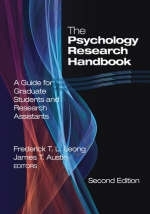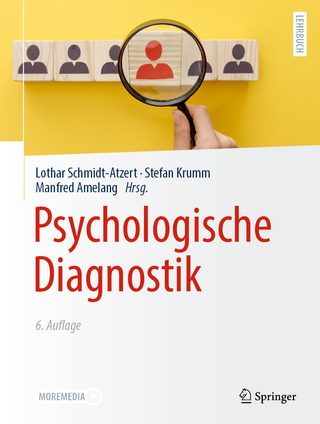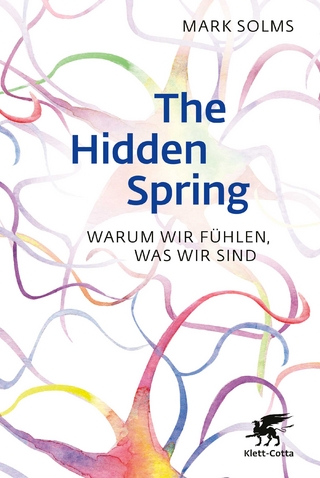
The Psychology Research Handbook
SAGE Publications Inc (Verlag)
978-0-7619-3021-1 (ISBN)
From the Foreword:
"This volume has the potential to spark a lifelong love affair with the psychology research process. Of special value are a dozen chapters on topics typically missing from other texts, including cross-cultural research, dealing with journal editors and reviewers, conducting meta-analyses, and using archival data sets. In my opinion, this is the book of choice for introducing the psychology research process to students and research assistants. . . . Although this volume was developed for students, experienced researchers would find this volume to be a useful refresher course, capable of re-igniting their own initial delight with the inquiry process."
—Anthony J. Marsella, Atlanta, Georgia
The book that established itself as a standard text and reference work for students seeking to master research methods and procedures in psychology has been updated and revised in this new edition! The Second Edition of The Psychology Research Handbook: A Guide for Graduate Students and Research Assistants once again offers a comprehensive guide for understanding and conquering the entire research process. Editors Frederick T. L. Leong and James T. Austin have assembled a distinguished group of expert researchers who share skill sets accumulated as a result of years of practical exposure to the design, development, implementation, and documentation of research in psychology. The chapters in this volume follow the sequential flow of the research process—from research planning and design to data collection and analysis to results writing.
New to the Second Edition:
Provides six new chapters that cover research scripts, statistical power, multilevel analysis, computational modeling, program evaluation, and scale and test development
Addresses the effects of technology in each chapter to integrate the importance of the Internet and related technology in that particular domain
Includes Student Exercises to supplement the Recommended Readings and Reference lists at the end of each chapter
The Psychology Research Handbook is the ideal textbook for graduate students studying advanced research methods in courses such as Research Methods in Psychology, Advanced Methods, Experimental Methods, Research Design and Methodology, Research Practicum, and Quantitative Research Design and Analysis in Psychology. It is also the perfect resource for research professionals as well as for individual research assistants in the midst of research projects.
Frederick T. L. Leong, Ph.D., is Professor of Psychology (Industrial/Organizational and Clinical Psychology Programs) and Psychiatry. He is also the Director of the Center for Multicultural Psychology Research at Michigan State University. He has authored or co-authored more than 250 journal articles and book chapters. In addition, he has edited or co-edited 12 books. Dr. Leong is a Fellow of the APA (Divisions 1, 2, 5, 12, 17, 29, 45, 52), Association for Psychological Science, Asian American Psychological Association, and the International Academy for Intercultural Research. His major research interests center around culture and mental health, cross-cultural psychotherapy (especially with Asians and Asian Americans), and cultural and personality factors related to career choice and work adjustment. He is past president of APA′s Division 45 (Society for the Psychological Study of Ethnic Minority Issues), the Asian American Psychological Association, and the Division of Counseling Psychology in the International Association of Applied Psychologists. He has served on the APA Board of Scientific Affairs, the Minority Fellowship Program Advisory Committee, and the Commission on Ethnic Minority Recruitment, Retention, and Training (CEMRRAT2) Task Force. He received the Dalmas Taylor Distinguished Contributions Award from the APA Minority Fellowship Program and the Stanley Sue Award for Distinguished Contributions to Diversity in Clinical Psychology from APA Division 12. He is also the 2007 co-recipient of the APA Award for Distinguished Contributions to the International Advancement of Psychology. James T. Austin (Ph.D., Industrial-Organizational Psychology, Virginia Tech University, 1987) is a Research Specialist 2 at The Ohio State University, specializing in the psychometrics of test creation and evaluation for Career-Technical Education at the secondary and community college levels. He served as Assistant Professor of I-O Psychology from 1991-1997 at Ohio State. His research on goal-setting, criterion measurement, and research methodology has appeared in Psychological Bulletin, Annual Review of Psychology, Journal of Applied Psychology, Personnel Psychology, Organizational Behavior and Human Decisions Processes. He is currently cowriting a book on analysis and prioritization of needs assessment data in program evaluation.
Foreword - Anthony Marsella
Acknowledgments
Introduction - James T. Austin, Frederick T. L.
PART I. RESEARCH PLANNING
Research as a script - Douglas A. Hershey, Joy M. Jacobs-Lawson, Thomas L. Wilson
Finding a research topic - Frederick T. L. Leong, Douglas J. Muccio
Bibliographic research - Jeffrey Reed, Pam Baxter
Reviewing and evaluating a research article - Kathryn Oleson, Robert Arkin
Program evaluation: Concepts and Perspectives - James Altschuld, James Austin
PART II. DESIGN, INSTRUMENT SELECTION OR DEVELOPMENT, & SAMPLING
Designing a research study - Bruce Wampold
Evaluating and selecting psychological measures for research purposes - Madonna Constantine, Joseph Ponterotto
Designing surveys and questionnaires for research - Robert Goddard, Peter Villanova
Scale development - John Lounsbury, Lucy Gibson, Rich Saudargas
Applying sampling procedures - William McCready
Statistical power - Brett Myors
PART III. DATA COLLECTION
Applying for approval to conduct research with human participants - Don Dell, Lyle Schmidt, Naomi Meara
Conducting mail & Internet surveys - Alan Vaux, Chad Briggs
Conducting telephone surveys - Peter Chen, Yueng-hsiang Huang
Collecting data in groups - Steven Zaccaro, Meredith Cracraft, Michelle Marks
PART IV. DATA ANALYSIS
Cleaning up data and running preliminary analyses - David DiLalla, Stephen Dollinger
Qualitative methods - Howard Pollio, T. R. Graves, Michael Arfken
A Basic guide to Statistical research and discovery: Planning and selecting statistical analyses - Charles A.Scherbaum
Basic statistical analyses - David Dickter
Using advanced statistics - Lisa Steelman, Paul Levy
Conducting a meta-analysis - Harris Cooper, Jorgianne Civey Robinson, Nancy Dorr
Archival data sets: Revisiting issues and considerations - Barbara Zaitzow, Charles Fields
PART V. RESEARCH WRITING
Writing in APA style: Why and how - Robert Calderón, James Austin
Writing rough drafts - Christopher Peterson
Revising a research manuscript - Donna Nagata, Steven Trierweiler
Dealing with journal editors and reviewers - Samuel Osipow
PART VI. SPECIAL TOPICS
Coordinating a research team: Maintaining & developing a good working laboratory - Dennis Molfese & Colleagues
Multilevel research - David Chan
Computational modeling - Michael Zickar
Applying for research grants - John Borkowski, Kimberly Howard
Cross-cultural research methodology - Kwok Leung, Fons Van de Vijver
Applying theories to research: The interplay of theory and research in science - Charles Gelso
The research script: One researcher′s view - Richard Petty
Index
About the Editors
About the Contributors
| Erscheint lt. Verlag | 29.11.2005 |
|---|---|
| Verlagsort | Thousand Oaks |
| Sprache | englisch |
| Maße | 177 x 254 mm |
| Gewicht | 1080 g |
| Themenwelt | Geisteswissenschaften ► Psychologie |
| ISBN-10 | 0-7619-3021-3 / 0761930213 |
| ISBN-13 | 978-0-7619-3021-1 / 9780761930211 |
| Zustand | Neuware |
| Haben Sie eine Frage zum Produkt? |
aus dem Bereich


